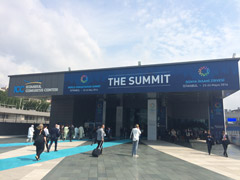JICA President Shinichi Kitaoka participated in the World Humanitarian Summit in Istanbul on May 23-24.
Aiming for further collaboration between humanitarian assistance and development aid to solve the refugee problem
On May 23, an event entitled "Strengthening the Humanitarian-Development Nexus: Collaborative Approaches to Finding Solutions for Forcibly Displaced Persons" was held at the World Humanitarian Summit. It was co-sponsored by the Japanese Government and Solutions Alliance*.

The World Humanitarian Summit venue
At the event, there was a discussion of the best ways to collaborate on humanitarian assistance and development aid for durable solutions to the problems of refugees and internally displaced persons. Mr. Kitaoka participated in a discussion of the best ways to collaborate based on the comparative advantages of various humanitarian assistance and development aid agencies. Other participants included Martin Bille Hermann, state secretary for Development Policy, Ministry of Foreign Affairs, Denmark; Steven Corliss, director of the Division of Programme Support & Management, Office of the United Nations High Commissioner for Refugees (UNHCR); and Izumi Nakamitsu, assistant secretary-general, assistant administrator and Crisis Response Unit leader, UN Development Programme (UNDP).
Mr. Kitaoka said the Japanese Government and JICA traditionally emphasize the concept of human security and have tackled the problem of refugees and internally displaced persons as a top priority issue. He explained that the comparative advantage of JICA, a development aid agency, in the area of refugees and internally displaced persons is threefold: 1. enhancing the resilience of host countries and communities, 2. empowering through vocational and education assistance and 3. providing assistance for state-building to prevent crisis recurrence and for repatriation and reintegration of refugees.
Mr. Kitaoka also stressed the importance, for solving the problems, of respecting the ownership of the host countries and communities and of offering refugees and internally displaced persons an environment in which they can get involved in productive activities. These points were included in a "joint statement" outcome document expected to be submitted to the summit secretariat as a contribution to the summit as a whole.
For this event, the following people gave speeches: Kazuko Shiraishi, ambassador for Women, Human Rights and Humanitarian Affairs, Ministry of Foreign Affairs of Japan; Kelly T. Clements, Deputy High Commissioner of UNHCR; and Helen Clark, administrator of the UNDP.
Announcing Japan's Determination to Mainstream Disaster Risk Reduction
On May 24, the following day, Mr. Kitaoka participated in the High-Level Leaders’ Roundtable on “Natural Disasters & Climate Change: Managing Risks and Crises Differently” as the Japanese Government representative. U.N. Secretary General Ban Ki-moon moderated the roundtable. It was held as an occasion for each country and agency to announce concrete actions toward achieving the content of the proposals in the report "One Humanity: Shared Responsibility" released by Mr. Ban in February.
The statement by the Japanese government for this roundtable emphasized the importance of promoting prior investment in disaster risk reduction and of "Build Back Better" initiatives, in which a disaster is used as an opportunity to carry out reconstruction in such a way as to create a society that is more resilient than it was before the disaster. It also manifested concrete actions the Japanese government will carry out for the international community based on the “Sendai Framework for Disaster Risk Reduction 2015-2030” adopted at the Third UN World Conference on Disaster Risk Reduction in March 2015.
* The Solutions Alliance is an international initiative begun in April 2014, aiming to improve the lives of displaced persons – and the communities that host them – by responding more collaboratively to displacement and contributing to durable solutions. Various stakeholders participate in this initiative, including Demark, the United States, Sweden, the European Union, Japan, the UNHCR, the UNDP, the World Bank, refugee host countries such as Colombia and Zambia, the International Rescue Committee and IKEA.




scroll